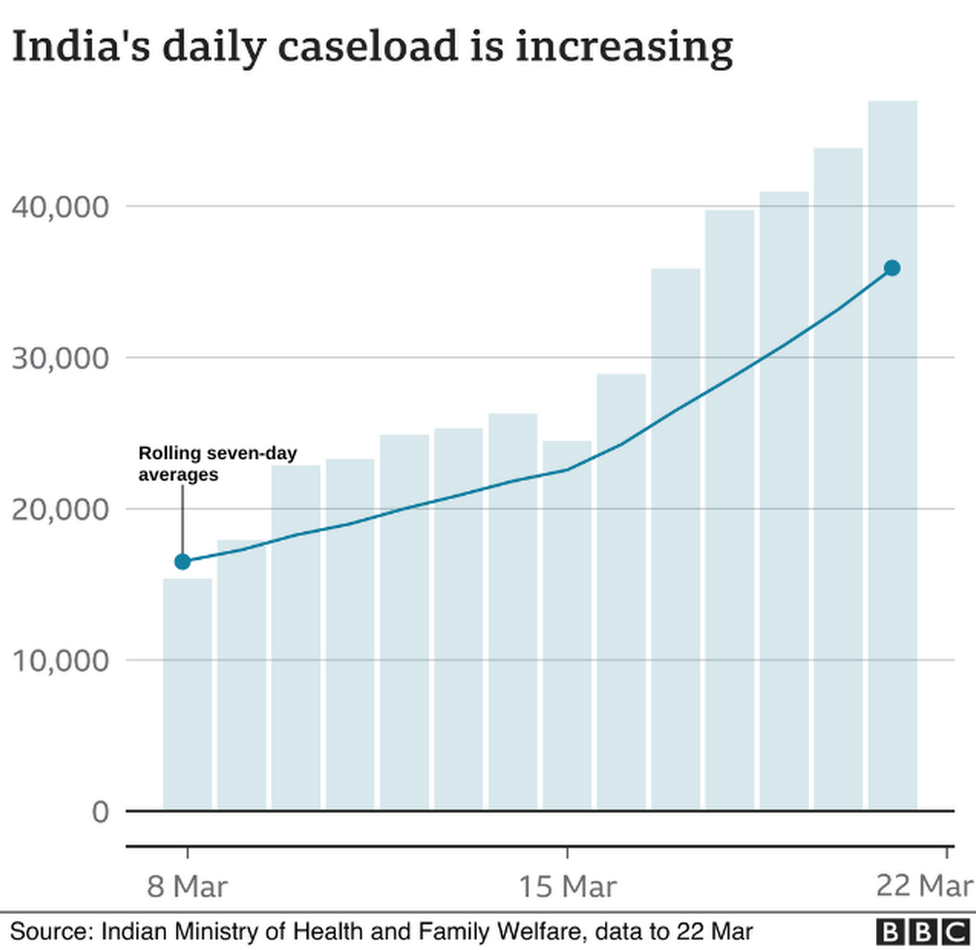A new "double mutant" variant of the coronavirus has been detected from samples collected in India.
Officials are checking if the variant, where two mutations come together in the same virus, may be more infectious or less affected by vaccines.
Some 10,787 samples from 18 Indian states also showed up 771 cases of known variants - 736 of the UK, 34 of the South African and one Brazilian.
Officials say the variants are not linked to a spike in cases in India.
India reported 47,262 cases and 275 deaths on Wednesday - the sharpest daily rise this year.
The Indian SARS-CoV-2 Consortium on Genomics (INSACOG), a group of 10 national laboratories under India's health ministry, carried out genomic sequencing on the latest samples. Genomic sequencing is a testing process to map the entire genetic code of an organism - in this case, the virus.
The genetic code of the virus works like its instruction manual. Mutations in viruses are common but most of them are insignificant and do not cause any change in its ability to transmit or cause serious infection. But some mutations, like the ones in the UK or South Africa variant lineages, can make the virus more infectious and in some cases even deadlier.
Virologist Shahid Jameel explained that a "double mutation in key areas of the virus's spike protein may increase these risks and allow the virus to escape the immune system".
The spike protein is the part of the virus that it uses to penetrate human cells.
The government said that an analysis of the samples collected from India's western Maharashtra state showed "an increase in the fraction of samples with the E484Q and L452R mutations" compared with December last year.
"Such [double] mutations confer immune escape and increased infectivity," the health ministry said in a statement.
Dr Jameel added that "there may be a separate lineage developing in India with the L452R and E484Q mutations coming together".

Are double mutants a worry?
Smitha Mundasad, BBC health reporter
A "double mutant virus" - it's a scary phrase. Breaking it down, the words suggests that Indian scientists have discovered two significant mutations - or changes - in different locations in a single variant of the virus.
That is not so surprising. Viruses mutate all the time but the questions that need answering are: does the presence of this double mutation change how the virus behaves? Will this variant be more infectious now, or cause more severe disease? And importantly, will current vaccines still work well against it?
Scientists will now be busy doing the detective work needed to find out the answers. Officials say because the proportion of tests that have come back with this double mutation is currently low, there is currently nothing to suggest this is behind the current surge in cases.
What is clear is that this double mutation, as different as it sounds, requires the same public health response. Increased testing, tracking of close contacts, the prompt isolation of cases, as well as masks and social distancing will all help. Reducing the pressure on India's over-burdened healthcare system is key.
In terms of vaccines - so far, for many variants of concern around the world they have been shown to be effective, though sometimes less so when compared to the original viruses they were designed against. Scientists are confident that if needed, existing vaccines can be modified to target new mutations.

The Indian government denies that the rise in cases is linked to the mutations.
"Though VOCs [variants of concern] and a new double mutant variant have been found in India, these have not been detected in numbers sufficient to either establish a direct relationship or explain the rapid increase in cases in some states," the health ministry said.
The recent report comes after several experts had asked the government to step up genome sequencing efforts.
"We need to constantly monitor and make sure none of the variants of concern are spreading in the population. The fact that it is not happening now doesn't mean it will not happen in the future. And we have to make sure that we get the evidence early enough," Dr Jameel told the BBC's Soutik Biswas earlier this month.


India became the fifth country in the world to sequence the genome of the novel coronavirus after isolating it from some of the first cases recorded in January last year.
More than 11.7 million cases and 160,000 deaths later, efforts are continuing to identify mutations.
The latest surge - which began this month - comes during what some experts have called a "delicate phase" for India - the healthcare system is already exhausted from a year-long battle against the coronavirus.
States have already begun re-introducing restrictions, including curfews and intermittent lockdowns.
Two major cities, Delhi and Mumbai, have also ordered randomised rapid tests at airports, railway stations and crowded areas such as shopping malls.
https://news.google.com/__i/rss/rd/articles/CBMiMmh0dHBzOi8vd3d3LmJiYy5jb20vbmV3cy93b3JsZC1hc2lhLWluZGlhLTU2NTA3OTg40gE2aHR0cHM6Ly93d3cuYmJjLmNvbS9uZXdzL2FtcC93b3JsZC1hc2lhLWluZGlhLTU2NTA3OTg4?oc=5
2021-03-24 13:44:16Z
52781459241323
Tidak ada komentar:
Posting Komentar